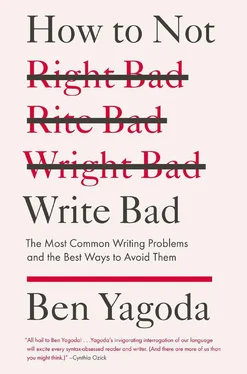The hurricane was the most spectacular event of the year, and newspapers devoted major coverage to it.
To make matters even more complicated, danglers are sometimes okay.
That sentence is an example of a certain class of opening modifiers, sometimes referred to as sentence adverbs , that get a pass when it comes to the whole dangling-modifier question. These are words or phrases that, rather than modify the subject, convey the speaker’s or writer’s attitude, or generally characterize the content of the rest of the sentence. For example:
Fortunately, the game will go on as scheduled.
To be perfectly honest, that course is pure hogwash.
Summing up this section, it’s pretty easy to spot a dangling modifier.
d. Parallel Universes
The parallelism problem crops up most commonly in lists. You want to make sure that every item is in the same basic form.
[ I like to hike, play disk golf, and just goofing off. ]
In the example above, the phrase I like to applies to the first two items in the list, but is mysteriously dropped for the third. As the Beatles once sang, “You can’t do that.” So change to:
I like hiking, playing disk golf, and just goofing off.
Sometimes, you need to just be listless:
[ He has experience in copyediting, graphics, and has won two professional awards. ]
He has experience in copyediting and graphics, and has won two professional awards.
The alluring phrase as well as creates a parallel problem in 1, below. It’s technically fixed in 2, but the sentence is awkward (a word you will run into again in Part III, many times).
1. [ World AIDS Day is devoted to spreading further awareness of HIV and AIDS, as well as a time of remembrance for the millions who have died because of the virus. ]
2. [ World AIDS Day is devoted to spreading further awareness of HIV and AIDS and is a time of remembrance for the millions who have died because of the virus. ]
3. World AIDS Day is devoted to spreading further awareness of HIV and AIDS. It’s a time of remembrance for the millions who have died because of the virus.
e. The Sports Conditional
This isn’t exclusively found in a sports context, but for some reason, athletes, fans, and commentators are unaccountably drawn to the phrase would have in considering scenarios that didn’t happen.
[ If Johnson would have caught that ball, the Bisons would have won the game. ]
If Johnson had caught the ball, the Bisons would have won the game.
The sports conditional seems particularly irresistible when wishing or hoping is involved:
“I wish I would have took a swing at that ball,” Prendergast said.
Well, you can’t change a quotation, but if Prendergast were writing his sentiments, the correct grammar would be:
I wish I had taken a swing at that ball.
Not technically an error, but pretty hackneyed, is “the sports present,” in which athletes and sportswriters recite hypothetic or conditional events in the present tense.
[ If he makes that interception, the whole game changes. ]
If he had made that interception, the whole game would have changed.
f. Between You and I, This One Bears Some Study
Take a look at this sentence and try to spot the problem word:
[ It would be great if you could come to the concert with my wife and I. ]
It’s the shortest and final one, I. Traditional grammar dictates that it should be replaced with me, on the principle that prepositions (such as with ) are followed by the objective ( me ) rather than the subjective case ( I ).
It would be great if you could come to the concert with my wife and me.
When only one pronoun is involved, absolutely no one has trouble with the principle. No one, that is, would write:
[It would be great if you could come to the concert with I. ]
Yet many, many people have problems when there are two or more elements in the noun phrase, especially when one of the elements is a pronoun indicating the speaker or writer.
[ Between you and I, that project is a disaster. ]
[ The teacher gave the assignment to she and I. ]
Between you and me, that project is a disaster.
The teacher gave the assignment to her and me.
Some authorities, notably Steven Pinker of Harvard, have argued in favor of the subjective case in this situation, thus provoking the wrath of traditionalists. The argument is that (drawing from the above examples) my wife and I, you and I, and she and I are better viewed as self-contained units than as a combination of pronouns. And, as units, they can be either object or subject. It’s the same (Pinker would contend) as a title like The King and I. And no one would write, I won two tickets to see The King and Me.
I have to admit I see the logic in the argument. But it doesn’t matter. Long and at this point unbreakable custom dictates that you must write my wife and me, you and me, and her and me in these cases.
g. Whomever
This word has only slightly higher grammatical standing than ain’t, but it’s used by millions more people. It yields 11.7 million hits on Google and more than 1,000 on Google News, which consists of articles written in the last month or so by professional and semiprofessional writers. The most recent (posted just two hours ago as I write) came from the Web site of New York City’s Fox News affiliate:
[ Meat Loaf has a bone to pick with whomever started the rumor that he passed out at a balloon festival in New Jersey this past weekend. ]
Like an overwhelming majority of the examples on Google News (and in my students’ work), whomever is incorrect here. You can see why the writer made the mistake— with is a preposition, and prepositions are traditionally followed by the objective case. But whomever started the rumor, etc. is a unit — a noun phrase, to be exact — so the correct word to kick it off is whoever.
Whomever has gotten so popular that people have started to use it even when there’s not a preposition to be found in the immediate area. A subject heading on a gamers’ bulletin board reads: “ATTN: Whomever owns zombieland server.” No excuse for that.
As you proceed on life’s journey, you may be tempted to use whomever. Resist the temptation, except in two relatively rare cases.
It’s the last word in the sentence and is immediately followed by a verb other than to be or by a preposition. I’ll go with whomever.
It’s a true object. The doctors will treat whomever the sick boy coughed on.
Looking at the awkwardness of those two sentences, I’m going to amend my rule, as follows:
Never use whomever.
h. Fragments of My Imagination
Sentence fragments (SFs) are a weird mistake. For one thing, virtually every professional writer uses them. Including me. Including me, of course, is a SF. It’s defined as a collection of words that’s treated as a sentence (that is, the first letter is capitalized and a period, question mark, or exclamation point comes at the end) but, because it doesn’t contain both subject and verb, doesn’t have the grammatical standing of a sentence.
Despite their popularity and usefulness, SFs earn some serious wrath in virtually every writing handbook on my shelf. The trouble is the examples these books give. Almost none of them are recognizable as anything that comes across my desk or appears on my computer screen. For example, The Little, Brown Handbook gives this as an instance of what not to do:
Читать дальше












